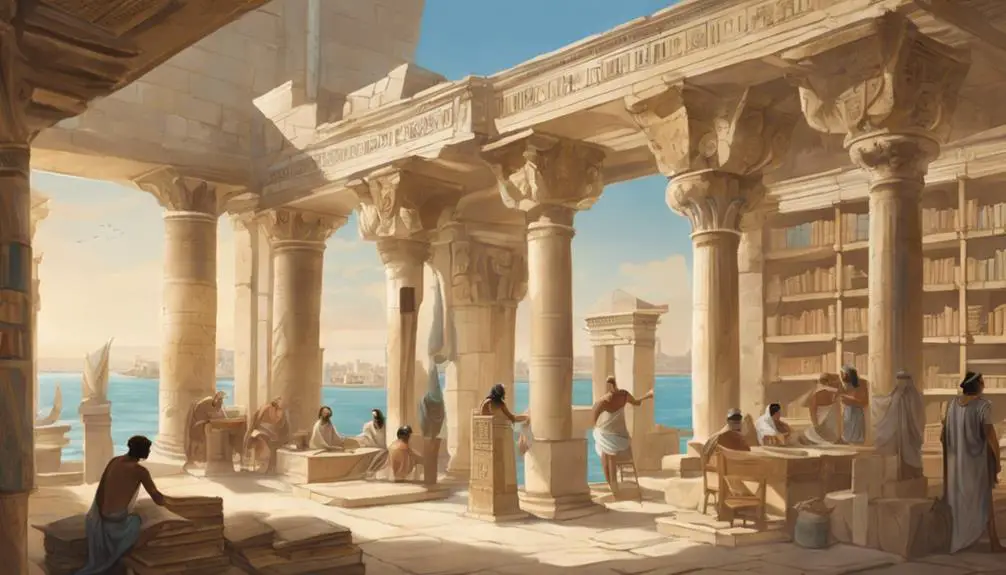From ancient texts to theological debates, Alexandria's biblical connections illuminate mysteries that beckon further exploration.

Alexandria in the Bible
You might think Alexandria was just a dot on the ancient map, but in reality, it was a colossal hub that significantly influenced early Christianity and the Bible.
As you explore its historical streets, you'll uncover how this city became a melting pot of cultures, ideas, and religious thought, shaping theological contributions that echo through time.
Alexandria's role in biblical narratives and its connection to key figures offers a fascinating glimpse into the past. But just when you start to grasp its importance, you'll realize there's a deeper layer to its story, compelling you to explore further into the mysteries it holds.
Key Takeaways
- Alexandria was a center for Christian teaching and theological development in early Christianity.
- The city contributed significantly to Christian doctrine through the integration of Greek philosophy.
- Alexandria's scholars, including Philo and Apollos, played pivotal roles in interpreting and spreading biblical texts.
- The translation of Hebrew Scriptures into Greek in Alexandria facilitated the spread of Christianity across different cultures.
Historical Background of Alexandria

Founded by Alexander the Great in 331 BC, Alexandria quickly rose to prominence as a cultural and intellectual hub in the ancient world. Situated on the Mediterranean coast of Egypt, its strategic location facilitated its growth into one of the most significant cities of its time. The city's founding was a calculated move by Alexander, aiming to establish a powerful Greek presence in Egypt. After his death, the Ptolemaic dynasty took control, further shaping Alexandria's destiny.
The Ptolemaic influence on Alexandria can't be overstated. This dynasty, descending from one of Alexander's generals, Ptolemy I Soter, transformed the city into a center of Hellenistic culture and learning. Under their rule, Alexandria flourished, notably with the establishment of the Library of Alexandria, a monumental testament to the city's intellectual ambitions. This era saw Alexandria at its zenith, a melting pot of Greek, Egyptian, and other cultures, making it a focal point of scholarly and cultural exchange.
The Ptolemies' contributions to Alexandria's development were profound, blending Greek and Egyptian elements to create a unique cultural identity. Their patronage of the arts and sciences propelled Alexandria into becoming a beacon of knowledge, its influence resonating well beyond its borders.
Alexandria's Role in Early Christianity
Alexandria's transformation into a pivotal center for early Christianity underscores its significant, multifaceted influence on the development of Christian thought and theology. As you delve deeper, you'll find that Alexandria wasn't just a backdrop for religious discourse but a dynamic participant in the shaping of early Christian identity. The city's substantial Jewish population, part of the broader Alexandrian diaspora, provided fertile ground for the spread of Christianity. This blending of cultures and beliefs facilitated unique interpretations and teachings of Christian doctrine, distinguishing the Alexandrian Christian community from others across the Roman Empire.
However, the journey wasn't devoid of adversity. Christian persecution in Alexandria, notably under Roman rule, served as a crucible for the faith. It tested and ultimately fortified the Christian community, fostering a sense of unity and resilience among believers. These trials didn't just contribute to the communal identity but also highlighted the city's role as a beacon of faith amidst adversity. Alexandria's experience with persecution, therefore, isn't just a historical footnote; it's a testament to the city's crucial role in the survival and expansion of early Christianity. Through these struggles, Alexandria emerged not only as a center of Christian thought but also as a symbol of faith's endurance against oppression.
Theological Contributions From Alexandria

Diving into the theological contributions from Alexandria, you'll uncover a rich tapestry of intellectual and spiritual advancements that shaped Christian doctrine profoundly. This ancient city wasn't just a hub for trade and commerce; it was a crucible for theological and philosophical thought, deeply influencing the development of Christian beliefs and practices.
- Integration of Greek Philosophy: Alexandria's educational system was unparalleled, seamlessly blending Christian theology with Greek philosophical influences. This synthesis laid the groundwork for Christian apologetics and doctrinal development.
- Origination of Catechetical School: The catechetical school of Alexandria stands out as an early center for Christian higher education, emphasizing scriptural interpretation alongside philosophical inquiry.
- Contribution to Christology: Theologians from Alexandria played pivotal roles in formulating key doctrines about the nature of Christ, balancing his divinity and humanity in ways that still resonate within the church.
- Development of Allegorical Interpretation: Alexandrian scholars pioneered allegorical interpretations of Scripture, enriching the spiritual understanding and allowing a deeper integration of philosophical concepts with biblical texts.
Through these contributions, Alexandria's theological legacy continues to influence Christian thought, underscoring the city's role as a bridge between ancient wisdom and Christian doctrine.
Biblical Figures and Alexandria
Building on the theological legacy of Alexandria, it's crucial to explore how biblical figures intersect with this city's profound historical and spiritual narrative. Alexandria, a hub of commerce, education, and culture, provided a fertile ground for cultural interactions and scholarly journeys of numerous biblical figures. These interactions were not merely incidental but shaped the course of biblical history and theology in profound ways.
Biblical Figure |
Connection to Alexandria |
|---|---|
Apollos |
An eloquent speaker from Alexandria, well-versed in the Scriptures, Apollos' journey to Ephesus reflects the city's role in shaping knowledgeable and persuasive Christian teachers. |
Philo |
A Jewish philosopher from Alexandria, Philo's work bridges Hellenistic culture and Jewish thought, illustrating the city's influence on theological scholarship. |
Mark the Evangelist |
Tradition holds that Mark founded the Christian church in Alexandria, marking a significant point of cultural and religious exchange. |
Josephus |
Though not directly associated with Alexandria, Josephus' writings provide insights into the Jewish diaspora's life in Alexandria, highlighting the city's importance in Jewish history. |
Jewish Scholars |
Engaged in the translation of the Hebrew Bible into Greek (the Septuagint) in Alexandria, showcasing the city's pivotal role in cultural and religious transmission. |
Through these examples, you can see how Alexandria served as a crossroads for cultural and religious exchange, deeply influencing the lives and works of these biblical figures.
Alexandria in Christian Scripture

While not explicitly mentioned in the New Testament, Alexandria's profound impact on early Christian scripture is undeniable, serving as a critical nexus for theological discourse and scriptural interpretation. This city, with its rich intellectual and cultural heritage, played an indispensable role in the early phases of Christianity, particularly in the areas of Alexandrian translations and Scripture preservation.
To understand Alexandria's influence, consider these key points:
- Alexandrian translations: The city was renowned for its scholarly work in translating Hebrew Scriptures into Greek, making them accessible to a broader audience.
- Scripture preservation: Alexandria's commitment to the preservation of Christian texts ensured that early theological works were safeguarded for future generations.
- Theological discourse: Alexandria was a hub for theological debate, fostering the development of early Christian thought and doctrine.
- Cultural exchange: The city's position as a melting pot of cultures facilitated the exchange of ideas, which enriched Christian scripture and practice.
Alexandria's contributions to Christian scripture aren't merely historical footnotes. They represent the city's pivotal role in shaping the foundations of Christian theology and the broader religious landscape of the ancient world.
Frequently Asked Questions
How Has Modern Archaeology in Alexandria Contributed to Our Understanding of Its Biblical Era?
Modern archaeology in Alexandria, particularly the discovery of underwater ruins, has significantly deepened your understanding of the city's history during the Ptolemaic dynasty.
These findings reveal intricate details about the urban layout, economic activities, and cultural exchanges of the era. By analyzing artifacts and architectural remnants, you've gained insights into the societal structures and daily life of its inhabitants, offering a richer, more nuanced perspective of Alexandria's historical significance.
Are There Any Lost Biblical Texts or Manuscripts Believed to Have Originated From Alexandria?
You're diving into a sea of ancient mysteries when exploring Alexandria's contribution to biblical texts. Many scholars believe that lost biblical manuscripts may have once graced the shelves of the famed Alexandria Library, a beacon of ancient knowledge.
These texts, pivotal to understanding early manuscript traditions, could shed light on variations and interpretations of biblical stories. However, without concrete evidence, these manuscripts remain elusive, their secrets locked away in history's silent embrace.
How Did the Cultural and Linguistic Diversity of Alexandria Influence the Interpretation and Translation of the Bible?
You'll find that Alexandria's cultural and linguistic diversity, rooted in the Ptolemaic Dynasty, significantly shaped Bible interpretation and translation.
The city's scholarly hub, the Library of Alexandria, fostered an environment where Greek, Hebrew, and Egyptian knowledge converged. This melting pot of ideas enabled richer, more nuanced biblical translations and interpretations, reflecting a blend of perspectives.
The diverse intellectual climate under the Ptolemies thus left a lasting impact on biblical scholarship.
What Role Did Alexandria Play in the Development of Early Jewish-Christian Relations Outside the Context of Christian Scripture?
You'll find Alexandria was a melting pot, fostering philosophical debates and economic impacts that shaped early Jewish-Christian relations.
Its diverse population and thriving intellectual climate encouraged dialogue and sometimes contention, laying groundwork outside scriptural contexts.
This city's economic power, coupled with its commitment to scholarly pursuits, allowed for unique interactions and understandings between these communities, significantly influencing their development and coexistence beyond biblical narratives.
How Have Contemporary Christian Denominations Viewed or Incorporated Alexandria's Biblical Heritage in Their Practices and Teachings?
You'll find that contemporary Christian denominations have diverse approaches to Alexandria's theological heritage. They often integrate Alexandrian theology, emphasizing allegorical interpretation and the pursuit of deeper spiritual meanings.
Coptic traditions, deeply rooted in Alexandria's early Christian community, are particularly influential. These practices and teachings reflect a profound respect for this ancient center of Christian thought, highlighting its enduring impact on modern Christian spirituality and scholarship.
Conclusion
In the tapestry of biblical history, Alexandria emerges as a vibrant thread, weaving together cultures and faiths. Its role in early Christianity isn't just a footnote but a cornerstone, shaping theological thought and scripture interpretation.
Here, biblical figures traversed, ideas flourished, and a rich Christian heritage was cultivated. Alexandria symbolizes a beacon of knowledge, a crossroads of civilizations, where the sacred and the scholarly coalesced. Its legacy in the biblical narrative is as profound as it's pivotal, a testament to the enduring power of faith and intellect combined.



Sign up